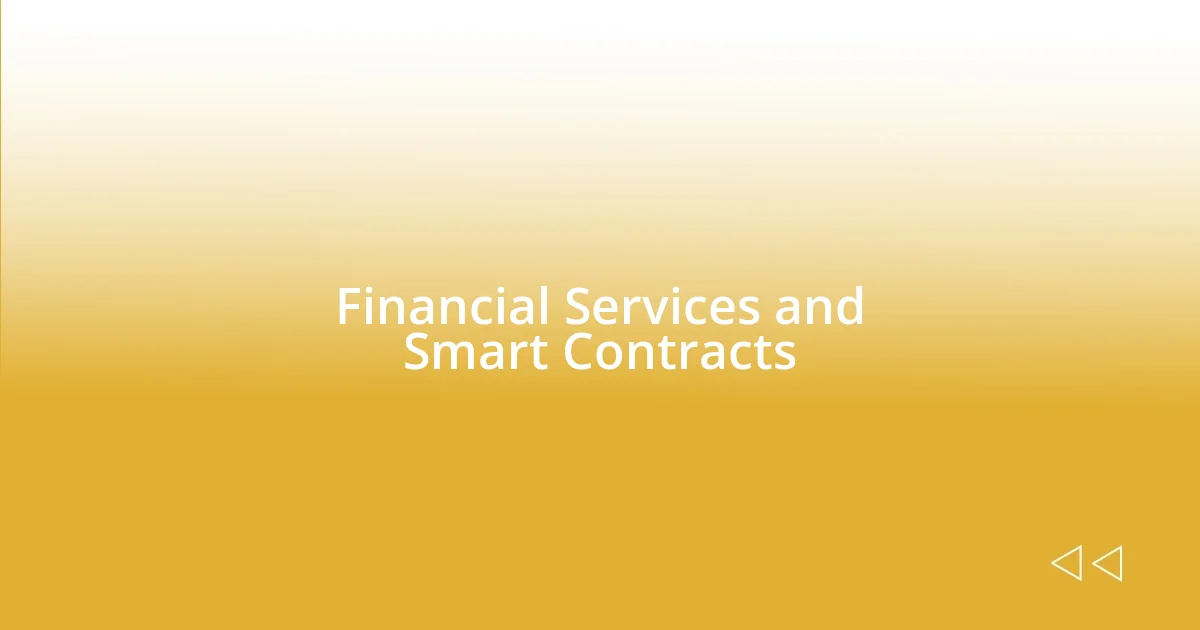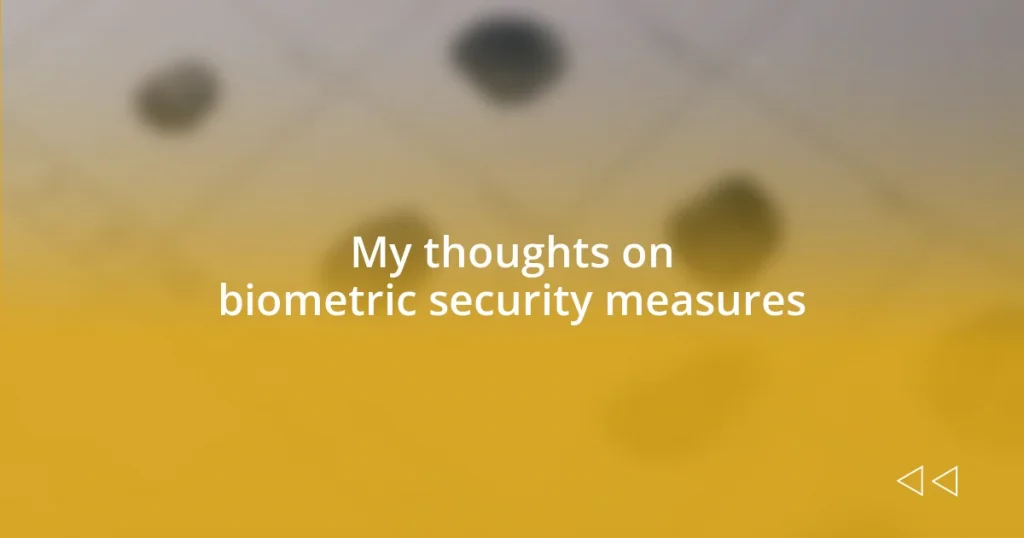Key takeaways:
- Smart contracts automate agreements, reducing fraud and transaction times while eliminating intermediaries.
- In financial services, smart contracts enhance processes like loan approvals and compliance with regulations, streamlining operations.
- The future of smart contracts includes AI integration, sustainability initiatives, and expansion into decentralized finance (DeFi), transforming various industries.

Introduction to Smart Contracts
Smart contracts are a fascinating innovation born from blockchain technology, acting like self-executing agreements with the terms directly written into code. I remember the first time I encountered them; I was intrigued by how they could revolutionize traditional contract processes by eliminating the need for intermediaries. Isn’t it amazing to think that a piece of code can hold such power and efficiency?
These digital agreements automatically enforce themselves when pre-defined conditions are met, which can significantly reduce the risk of fraud and increase the speed of transactions. I often wonder how many time-consuming disputes could be avoided if businesses embraced this technology more fully. It’s as though we’re on the brink of a new era in how we manage trust and transactions.
As I dive deeper into the world of smart contracts, I find myself increasingly excited about their potential use cases across various industries—from finance to supply chain management. Have you ever thought about how quickly processes could be streamlined with this kind of automation? It’s an exhilarating thought to consider the endless possibilities this technology unlocks in our increasingly digital world.

Overview of Smart Contract Benefits
When I reflect on the benefits of smart contracts, two key themes come to mind: trust and efficiency. These digital agreements foster an environment where trust is inherent due to the transparent and immutable nature of blockchain technology. In one situation, I witnessed a startup implement smart contracts to manage their funding rounds, simplifying what used to be a long, arduous process. The speed and clarity they achieved were remarkable, and it left me pondering how transformative such technology could be across various sectors.
Here are some notable benefits of smart contracts:
- Automation: Automating processes reduces human error and oversight, leading to smoother operations.
- Cost-Effective: By minimizing the need for intermediaries, organizations can save significant costs.
- Speed: The ability to execute transactions instantly when conditions are met accelerates entire workflows.
- Transparency: All parties can view and verify contract terms, enhancing accountability.
- Security: Cryptographic features limit the risk of hacking, making them secure compared to traditional methods.
It’s incredible to see how these benefits could reshape our approach to agreements and transactions, don’t you think?

Financial Services and Smart Contracts
Financial services are one of the most promising sectors for the application of smart contracts. From my perspective, the automation of loan approvals or payment processing can really transform customer experiences. I recall speaking to a financial advisor who highlighted how smart contracts could simplify complex mortgage agreements, making them secure and efficient. The potential reduction in processing time was something both she and I found incredibly appealing.
Additionally, consider how smart contracts facilitate cross-border transactions. They can eliminate the tedious steps typically involved, like currency conversions and verifications, by executing automatically based on determined conditions. I remember discussing with a friend who works in international trade how this speed could lead to significantly less capital tied up in transactions, allowing funds to flow freely and efficiently. Doesn’t it make you think about the future of business operations in a globalized world?
Finally, the ability of smart contracts to enhance compliance is noteworthy. In my experience, compliance with regulations can often be a cumbersome process, consuming valuable resources. With smart contracts, compliance measures can be encoded directly into the transaction, automatically ensuring all parties adhere to legal standards. It makes me optimistic to think about the ease with which businesses can operate while maintaining the integrity of financial regulations.
| Financial Service | Smart Contract Benefit |
|---|---|
| Loan Approvals | Automated processing leads to faster approvals. |
| Cross-Border Transactions | Eliminates need for currency conversion. |
| Compliance with Regulations | Encoded compliance simplifies adherence to laws. |

Smart Contracts for Intellectual Property
When I think about intellectual property and smart contracts, I can’t help but feel a surge of excitement about the innovations they bring. Imagine an artist being able to automatically receive royalties every time their song is played. I had a conversation with a musician who shared their frustrations over delayed payments from streaming platforms. Integrating smart contracts would not only ensure they got paid promptly but also reinforce the accuracy of contract terms—no more complex negotiations!
Delving deeper, the use of smart contracts can revolutionize the way patents are managed. I recall discussing with a friend who’s an inventor how cumbersome the patent processing can be. With smart contracts, the details of patent ownership can be encoded directly onto the blockchain, allowing for real-time tracking and verification. Isn’t it fascinating to think that inventors could maintain control over their creations without the fear that someone might exploit their work without permission?
Moreover, these contracts can serve as a safeguard against infringement. I once attended a seminar where a tech expert explained how, through blockchain, you can establish proof of ownership and timestamp it securely. This means if someone tried to claim your work as their own, you would have undeniable evidence. Doesn’t that make you feel more empowered as a creator or innovator? The potential for using smart contracts in intellectual property is truly limited only by our imagination!

Future Trends in Smart Contracts
The future of smart contracts is poised for remarkable evolution, especially with advances in artificial intelligence (AI) integration. I vividly remember chatting with a tech enthusiast who pointed out how AI could help smart contracts analyze vast datasets to make decisions in real time. Can you imagine a world where contracts adjust to market changes automatically, minimizing human error? It’s a game-changer in industries where rapid responses are crucial.
We’re also likely to see smart contracts expanding into the realm of sustainability and renewable energy. At a recent sustainability conference, a speaker showcased how smart contracts can facilitate peer-to-peer energy trading. I found it fascinating to think about individuals buying and selling excess solar power among themselves! This level of decentralization not only empowers consumers but also promotes the use of cleaner energy solutions. Isn’t it encouraging to see technology driving positive environmental impact?
Lastly, the rise of decentralized finance (DeFi) brings exciting possibilities for smart contract use cases, particularly in lending and insurance. I recall exploring a DeFi platform where users could lend cryptocurrency without intermediaries, making transactions both rapid and secure. As more people become aware of these options, I believe we’ll witness mainstream adoption. Could this shift redefine our entire perception of financial transactions? The potential seems limitless!















